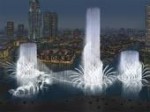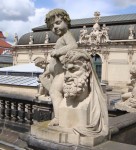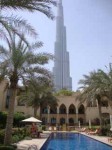Novelist seeking words in storied lands

DUBAI: Michelle’s apartment looks out upon Dubai Fountain. Click here for one of many u-tube videos.

DRESDEN The Zwinger Palace
Our year abroad on a budget approaches an end. Our strategy was to live where it was inexpensive (Rovinj, Croatia) in order to afford better (Dresden, Germany), then giga-expensive (Dubai) (visiting a child). It has worked.
Patrice and I have temporarily went our separate ways, she to Boulder, Colorado to teach and I to Dubai. We will meet in Northern Wisconsin in mid-October to spend the winter at the farm. Weather predictions suggest the coming winter will be as the last––brutally cold, overcast and heavy snow. Note to Robert; buy firewood.
I’ve come to Dubai visit my daughter and to finish the third novel, Executioner’s Son, in The Long War series. My child has been the personification of kindness and hospitality. The novel is a bastard.
I know about as much as you what the finished Executioner’s Son might look like. The protagonists, Danton Larionov and Ekaterina Soroka, are Russian, the novel taking place in Soviet Russia circa 1952-1962. They enter one another’s life in Suzdal, a once beautiful Russian medieval monastic city, now a Gulag. I both understand and do not understand what drives these two young people. They are of course human with human failings and yearnings, but also Soviet Russian young people coming of age in a blood-drenched era from whose capitol, Moscow, the orders emanated to murder millions.
In Dresden, in the former East Germany, Soviet occupied for forty-five years, they glance eastwards with a quivery nervousness as Vladimir Putin, the former Dresden KGB boss, presses westward. Might he be satisfied with Ukraine?
Vladimir Putin is neither a Stalin nor a Hitler; perhaps, Mussolini. I am reading two books this summer––Bloodlands:Europe Between Hitler and Stalin by Timothy Snyder and Jerusalem: The Biography by

Where I write, the view from…Burj Khalif
I write in the coffee houses of the Dubai Mall where interesting people pass by. Contemporary Dubai brings to mind, to my mind at least, the Central Asian caravan town of Bukhara, less the skyscrapers, as when Marco Polo, the Genoan, traversed the Silk Road in 1271. Dubai, some twenty years ago a dusty pearl fishing village, has sprung forth as a vision, Disneyland, or perhaps better, a Muslim Las Vegas. There had been nothing-no oil, no industry, not agriculture-there was only an Emir who understood the OPM (other people’s money) concept to float this city from the desert.
Like Bukhara, his idea is to make this a trading center (well, financial center) of the middle east. He has filled the Dubai Mall and the Mall of the Emirates with Russians and Ukrainians, Americans and British, Asians, Africans and Europeans. An Arab man in flowing white robe (dishdak) and red-checked headgear sits with a one-year-old asleep on his shoulder and listens with quiet intent to his three-year-old strong-willed and articulate daughter question him. All in all, save for the costumes, the foot traffic––terminally bored teens, children importuning mothers, tourists and young lovers walking hand-in-hand assessing furniture and appliances––is familiar enough. The United Arab Emirates is today the rare non-warring place in the region, haven to terrorist and western soldier, the region aflame, victim to its own thousand-year-old religious schism and fickle American foreign policy.
A note. Liar’s Path, LLC, my publisher, will release The Wounded, the second novel in my Long War series, on 1 October this year. Don’t worry. I’ll let you know.




